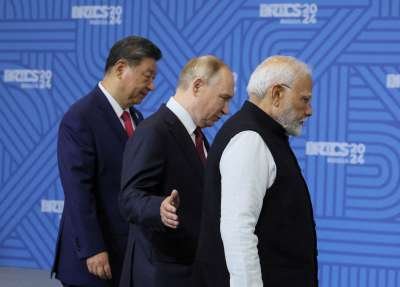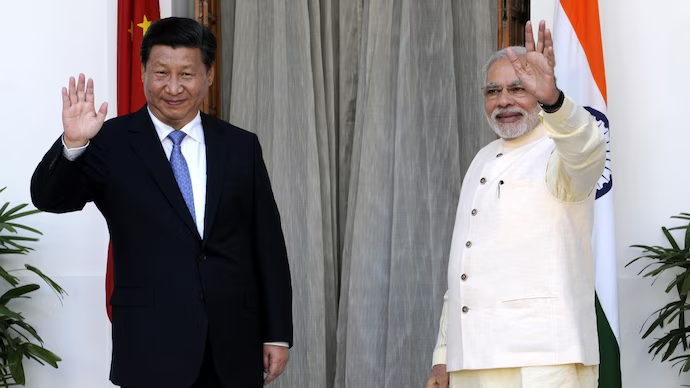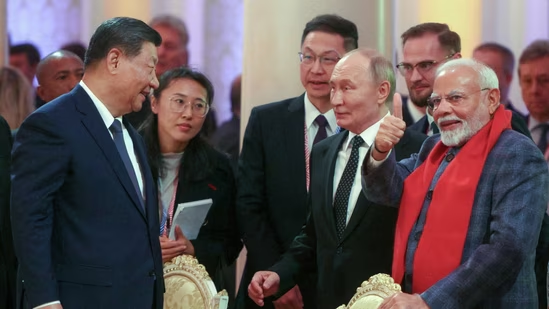Key highlights:
In a glimmer of thawing potential in significantly strained relations between two Asian giants, Prime Minister Narendra Modi met Chinese President Xi Jinping on the sidelines of the 16th BRICS Summit in Kazan, Russia, for their first formal bilateral talks in five years. This much-anticipated meeting focused primarily on the contentious issues of both LAC along eastern Ladakh, as flare-up of an issue since the 2020 Galwan Valley clash led to the loss of six Indian army personnel and four Chinese troops. He reiterated the seriousness for peace and stability, promising peace-broker of the present border agreement reached recently to be a crucial step toward disengagement.
Peace and Stability: Modi’s Central Message
Within this context, in opening the talks, India’s Prime Minister referred to peace and tranquility at the border as sine qua non for stable India-China relations. The Indian Prime Minister was optimistic when he declared, “We believe that the India-China relationship is not only crucial for the people of our countries but also for regional and global peace, stability, and progress.” This is where the forward-looking words of Modi were particularly promising regarding rebuilding mutual trust and cooperation. The two countries agreed to resume patrolling at crucial friction points in the LAC in a major step forward in alleviating the tensions that have bedeviled the region.

It also reflected India’s larger foreign policy mantra to resolve disputes through dialogue and diplomacy, a position Modi has been espousing enthusiastically over the past few years. The success of the latest agreement holds out promises as a diplomatic breakthrough, as leaders agreed to exploit diplomatic channels to take further disengagement forward.
Xi Jinping Wants to Improve Communication
Chinese President Xi Jinping said that the communications and cooperation between the two nations should be improved. He also attached importance to properly managing the differences so as not to allow relations between the two countries to deteriorate further. Xi said, “It is necessary that both sides communicate more effectively and manage our differences with an eye to creating development aspirations and regional stability.” His message indicated China’s intent to make coexistence work by working out the border question and then moving on to a more cooperative relationship with India.

Xi’s remarks also highlighted the fact that India and China could become a game-changer in building up the strength and cohesion of the developing world in international forums. This, in a way, is BRICS’ broader objective: to enhance multilateralism and strengthen the voices of new economies.
Border Disengagement: A Critical Breakthrough:
One of the major takeaways from these talks is the hurried disengagement across the LAC. The two countries agreed on the border after weeks of wary negotiations, marking an end to a standoff that has greatly strained diplomatic ties since 2020. Resumption of patrols is seen as a major step toward restoring normalcy along the disputed border areas.
Indian Foreign Secretary Vikram Misri, further elaborating, said that both leaders have “instructed their special representatives on the border issue to meet at an early date” and continue work on de-escalation. A key takeaway of the dialogue seems to be about “mutual trust, respect, and sensitivity” wherein Modi remarks that this must be the future of the relationship between India and China.
Strategic Significance of the India-China Relationship
The talks between Modi and Xi come at a time when both nations are grappling with not one or two but numerous global and regional challenges, ranging from economic uncertainties to geopolitical tensions and shifting global power structures. Given the stature and influence of these two most populous nations and prime BRICS players, any resolution to their border issue would draw considerable implications for peace and security globally.
Both Modi and Xi concurred on the stability and predictability required in India-China relations not just for their populations but for the broader region as well. And both countries have called upon this resolution of border tensions as they engage each other in domains where India expands its influence in world forums and China enhances strategic partnership.
The Road Ahead: Mutual Respect and Cooperation
The bilateral talks between Modi and Xi lay an essential ground in the rebuilding of relations between both countries. Though numerous disputes in respect of the LAC remain unsolved, the last round of dialogue has set in a harmonious note for future engagements for the diplomats. The promise of dialogue and mutual respect, with an agreement to border disengagement, surely holds great promises for the future for the stable and cooperative understanding of ties.
However, it is their respective governments which will determine the success of these talks while the two leaders try to navigate their complex bilateral relations. Their meetings of special representatives on the border issue will be crucial in ascertaining whether this momentum can be sustained.
Yet in the larger momentum of the BRICS Summit, the Modi-Xi talks were crucial in projecting an opportunity for rising economics to work towards contributing solutions to global challenges. In the midst of global uncertainty, no relationship is as important for India as that with China.
For Latest News Updates Click Here
